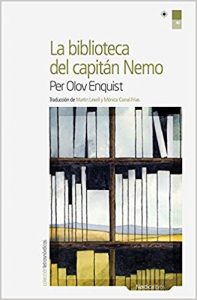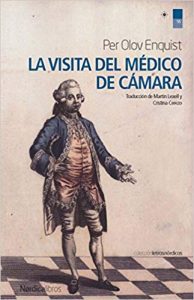Swedish writer Per Olov Enquist it could be considered something like the black sheep of current Swedish literature. More than anything because it is this country that to a greater extent serves the cause of Nordic noir, that vein exploited by authors such as David lagercrantz, in the inexhaustible Millennium saga, or the best-seller Camilla Lackberg.
But it is also true that Per Olov EnquistAt his age, he is back from everything and ends up writing with enviable freedom. Whose abounds in literature for a full vital conviction without any horizon of foolish glories that no longer interest to enjoy.
Unfortunately only with that conviction that age grants, or an absolute liberation difficult to conquer in these times, it finally happens that one decides to write what comes from within, in the dilemma between the visceral, the emotional, the passionate , all seasoned or rather condemned in the case of Enquist, by the rational.
So if you want to enjoy those literature that leaves you speechless, not through ingenious twists, but really, until you wake up a frank smile or a tear raised from the depths of the well that each one houses, Olov Enquist can be a great storyteller for you.
Top 3 Recommended Books by Olov Enquist
The book of parables
Who has not lived a forbidden love? Without loving the impossible, the forbidden or even the reprehensible (always in view of others), you will probably never be able to say that you have loved or lived, or both. Olov Enquist makes a more than likely gesture of honesty with himself. A recognition of romantic love (in the spiritual and in the physical. Or from the physical towards the spiritual) The love that was between the mature woman and the adolescent could have been considered at the time as an embarrassing, immoral or reprehensible encounter.
But in the case of the adolescent, assuming he was who Olov Enquist has become, he has surely proliferated on great pages of world literature. Are we then in debt to adultery or promiscuity or whatever there is really in that first love as a subject of study between teacher and student? There are undoubtedly autobiographical overtones in the pages of this book. The author himself acknowledges it. At the same time that it recognizes a kind of creative debt.
The sensation of a love learned between the arms and legs that another sheltered him could be the most fruitful of his creative roots. Live then the unexpected love, the one that hides to become universal, the one that awakens the creativity of the forbidden. To be honest with himself, the author has wanted to write what until now was traced in the lines of his destiny and his soul. Anyone who has not loved the impossible should not read this book. Everyone else, including you, cannot miss this opportunity.
Captain Nemo's Library
Captain Nemo's Library Well it is true that Olov Enquist does not belong to Norse noir. And yet there is an I don't know what in this novel of dark echoes, shared thanks to that icy setting, like characters always stepping on a permafrost that reflects the harshness of their own existence.
From a more than possible confusion of children born on the same day, Olov Enquist deploys all his gift to combine action and reflection, existentialism in the midst of the most adverse realities, to the point of a magical estrangement, between the dreamlike, the desired by human beings and contradiction as an essence converted into our habitat thanks to the gift of reason.
The work moves like a continuous metaphor between the snow that covers the earth, the beauty and its sinister discovery in solitude.
In his solid prose, Enquist always awakens a lyric of the image and the symbol that makes him a strange poet who finds in the prosaic the excuse to develop the most soulless verses.
The visit of the chamber doctor
Cristian VII suffered from his mental illness covering it up in the typical fantasies that cajole the people, ignorant of the real state of things.
Perhaps that is why Cristian wanted to entrust his cure in the hands of an avant-garde doctor. Only that the doctor in question took advantage of his entrance into the king's chamber to bring a freshness and modernity that soon impacted the interests of so many inhabitants of the court.
It usually happens with the characters out of time. That doctor, Johann Friedrich Struensee, should not be in the eighteenth century and less in a wolf's mouth as backward as a court. Shortly after entering to heal the king, he was beheaded.
And that which came to act as valid for the king in a multitude of matters with a transforming will (without a doubt that is why he ended up losing his head, literally speaking).
In the meantime, the author plunges us into what is known and assumed about a character who by himself already announced a modernity that would still take several decades to arrive, when illustration was already looking into a nineteenth century, now more open to certain changes ...



